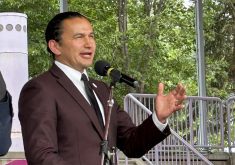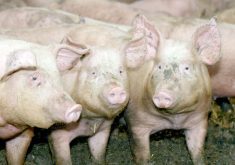None of Manitoba’s main political parties is threatening to reimpose the infamous hog barn moratorium.
That moratorium, begun in the Red River Valley in 2007 and then extended across the province, initiated a contraction in both hog farming and pork processing in Manitoba.
“We’ll definitely look at options for expansion,” NDP Selkirk candidate Mitch Obach, whose party brought in the moratorium, said in an interview after an election forum on agricultural issues. Manitobans go to the polls Sept. 10.
“I think part of the focus has to be on staying out of the hot zone and looking at more options in western Manitoba.”
Read Also

Farming Smarter receives financial boost from Alberta government for potato research
Farming Smarter near Lethbridge got a boost to its research equipment, thanks to the Alberta government’s increase in funding for research associations.
Liberal Lac du Bonnet candidate Terry Hayward said individual hog barns need to be assessed by their likely impact on the local environment. Fortunately, science and modern design are making new barns more sustainable.
“We could get some very good barns up,” said Hayward.
“We could do some good manure storage, as well as distribution on the land.”
Future measures on hog barn construction and operation should be contained in regulations, not legislation, he said. Legislation can become inflexible.
The Green Party says in its platform that it wants to “mandate the strengthening and enforcement of manure management regulations for hog barns, chicken barns and feedlots in the Red River basin to eliminate manure run-off,” but hasn’t made hog barns an issue in this campaign.
Since coming to power, Brian Pallister’s PC government has removed most of the elements of the hog barn moratorium and has loosened building code requirements so that new hog barns can be built at prices similar to those in Saskatchewan and Ontario.
It has also openly avowed its support for the hog industry, in marked contrast to the tone from the NDP government, which was grudging at best.
“We’ve been very clear we want to grow the hog business in Manitoba,” said Ralph Eichler, minister of agriculture, who was also on the election panel.
“We have 28 hog barns on the way. We need 75.”
Like the representatives of the other parties, he said western Manitoba, which is phosphorus deficient, is best suited for new hog barn development.
Manitoba has among North America’s toughest manure management regulations, brought in before the hog barn ban. The ban occurred in a period in which hog barn development was associated with the former PC government of Gary Filmon. It was a time when hog barns in North Carolina were associated with widespread water pollution, and in a period when supporters of the political left and environmentalists saw the development of large-scale, vertically-integrated agriculture as a threat to family farms and sustainable farming.
In recent years it has become less of an issue in Manitoba politics. The Maple Leaf slaughter plant in Brandon has had to reduce slaughter partially due to the shortage of pigs in the province as overall provincial hog production stagnated and fell during the moratorium.


















